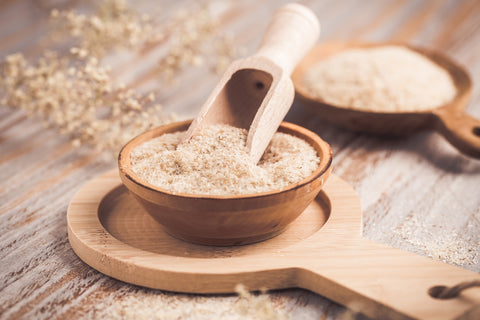Psyllium (Isabgol) is a medical plant that originates from India. The term “Psyllium” is used for the crust, seed and the whole plant. It is considered a good source of soluble and insoluble fibres and a prebiotic.
The Benefits of Psyllium Husk
It is eight times more soluble than oat bran (Verma & Morga, 2013). Psyllium Husk contains 6.83%protein, 4.07% ash and 84.98% carbohydrates (Verma & Morga, 2013).
The seed consists of 35% soluble and 65% insoluble long chain sugar molecules (cellulose, hemicellulose, and lignin).
Psyllium is a natural fibre derived from Psyllium seed husks. It is a long-branched sugar molecule which has a high water-holding and gelling capacity (Verma & Morga, 2013). That is why it is often referred to as a bulking fibre, because of its bulk-forming laxative effect; one of the many health benefits of psyllium husk.
Gastrointestinal Benefits
Once it is consumed, it expands, forming a gel-like mass by drawing water in from the colon. In this way, it promotes easy, healthy removal of waste, out of the colon more quickly and efficiently (Verma & Morga, 2013).
By promoting the absorption of water, which increases the size and moisture of stools, Psyllium Husk is considered an excellent supplement to relieve constipation.
A study by Stevens et al. (2008) found Psyllium Husk had a greater effect than wheat bran on the moisture, total weight and texture of stools.
Stevens et al. (2008) measured the time taken to pass through the body, frequency, stool weight, and stool consistency in 12 subjects who were each given fibre supplements containing wheat bran, psyllium husk, and a combination of wheat bran and psyllium husk, or a low-fibre control, for 2 weeks.
Psyllium had a greater effect than wheat bran on the amount of water found in the stools and the total stool weight.
On the days that stools were passed, 50% of the daily ratings were scored as "hard stool" when subjects received the control supplement. Less than 10% of the ratings were scored as "hard" when subjects received the husk supplement.
McRorie et al compared different types of laxatives by studying the effect of Psyllium Husk compared to Docusate Sodium, a well-known drug used as a stool softener or laxative.
This study showed that Psyllium Husk is superior to Docusate Sodium in softening stools by increasing stool water content and has better overall laxative efficacy in subjects with constipation (McRorie et al., 2011).
Effects on stool characteristics, time taken to pass through the body and rectal function in constipation were also assessed in a study done by Ashraf et al. (2005).
In this study, Ashraf et al concluded that taking 5.1 grams of Psyllium Husk, twice a day for two weeks can significantly increase the water content and weight of stools, as well as the total number of bowel movements, in 170 individuals with constipation.
It has also been shown to relieve diarrhoea. It does this by acting as a water-absorbing agent, which can increase stool thickness and slow down its passage through the colon (Singh, 2007).
Psyllium Husk significantly decreased diarrhoea in 30 cancer patients undergoing radiation therapy (Murphy et al., 2000).
In another study, Psyllium has been reported to slow down mass stool movements after lactose consumption, to benefit patients with irritable bowel syndrome, improving symptoms of constipation and diarrhoea (Washington et al., 2008).
Blood Glucose Levels and Cholesterol Levels
The gel-forming ability of Psyllium Husk also benefits blood sugar and total amount of cholesterol (Ganji & Kies, 2009).
A study done by Anderson et al. (1999) examined the effects of administering Psyllium. In this study, Psyllium husk decreased post-food glucose concentrations and cholesterol concentrations in men with type 2 diabetes and high cholesterol levels.
In another study, a higher daily dose of 5g consumed three times per day, for six weeks resulted in a 29% reduction in blood sugar levels, within the first two weeks, in people with type 2 diabetes (Rodriguez et al., 1998). This indicates that a higher daily dose of at least 10g can promote lower blood glucose levels.
The cholesterol-lowering effect is due to its ability to remove bile acids from the body.
Psyllium Husk can bind to fat and bile acids, promoting their removal from the body. In the process of replacing these bile acids, the liver uses cholesterol to produce more. As a result, blood cholesterol levels decrease.
It has been shown to lower LDL (bad) cholesterol but also increase high-density lipoproteins (HDL) good cholesterol, significantly.
In a study done by Wei et al. (2009) Psyllium Husk was shown to produce dose and time-dependent LDL cholesterol-lowering effects in mild and moderately high-cholesterol patients.
Rodriguez et al. (1998) found participants who were taking a higher daily dose experienced increases in HDL cholesterol by up to 45.7%.
Prebiotic
Psyllium Husk is also known as a prebiotic, nourishing the healthy-probiotic bacteria in the gut and helping them to grow. It can promote short-chain fatty acid production and decrease digestive discomfort in patients with ulcerative colitis and Crohn's disease.
In a study done by Fujimori et al. (2009) a combination of Psyllium and probiotics was shown to be particularly effective at treating ulcerative colitis and Crohn's disease.
Safety
Psyllium is well tolerated by most people. Doses of 5-10 grams taken three times per day are not linked to serious side effects. However, some cramping, gas or bloating may occur.
It could delay the absorption of certain medications. Therefore, it is not recommended to take it with any other medicines.
Dosage
It can be consumed in doses of 5-10 grams with meals, at least once per day. However, when it comes to fibre, more is not always better.
The benefits seen in most studies are linked with intakes of 3-20 grams per day, and taking more may cause digestive system problems. Drinking more water, regularly throughout the day is important.
As a bulk laxative supplement, 5 grams with a glass of water three times per day is often recommended as a starting point. This can be gradually increased, as tolerated.
Magnesium supplements are also useful to relax the bowel and help manage gastrointestinal problems.
References
- Anderson, J.W., Allgood, L.D. et al. (1999). Effects of psyllium on glucose and serum lipid responses in men with type 2 diabetes and hypercholesterolemia. The American Journal of Clinical Nutrition. 70 (4), 466-470.
- Ashraf, W., Park, F., Lof, J., Quigley, E.M. (2005). Effects of psyllium therapy on stool characteristics, colon transit and anorectal function in chronic idiopathic constipation. Alimentary Pharmacology and Therapeutics. 9 (6), 639-647.
- Fujimori, S., Gudis, K., Mitsui K. et al. (2009). A randomized controlled trial on the efficacy of synbiotic versus probiotic or prebiotic treatment to improve the quality of life in patients with ulcerative colitis. 25 (5), 250-255.
- Ganji, V., Kies, C.V. (2009). Psyllium husk fibre supplementation to the diets rich in soybean or coconut oil: Hypocholesterolaemia effect in healthy humans. International Journal of Food Sciences and Nutrition. 6 (9), 103-110.
- Murphy, J., Stacey, D. et al. (2000). Testing control of radiation-induced diarrhoea with a psyllium bulking agent: a pilot study. Canadian Oncology Nursing Journal. 10 (3), 96-100.
- McRorie, J.W., Daggy, B.P. et al. (2011). Psyllium is superior to docusate sodium for treatment of chronic constipation. Alimentary Pharmacology and Therapeutics. 12 (5), 491-499.
- Rodríguez-Morán, M., Guerrero-Romero, F., Lazcano-Burciaga, G. (1998). Lipid and glucose lowering efficacy of Psyllium in type II diabetes. Journal of diabetes and its complications. 12 (5), 273-278.
- Singh, B. (2007). Psyllium as therapeutic and drug delivery agent. International Journal of Pharmaceutics. 4 (2), 334-352.
- , J, VanSoest, P.J. et al. (2008). Comparison of the effects of psyllium and wheat bran on gastrointestinal transit time and stool characteristics. Journal of American Dietary Association. 88 (3), 323-326.
- Verma, A., Morga, R. (2013). Psyllium Husk: A wonder food for good health. International Journal of Science and Research. 13 (6), 438-442.
- Washington, N., Harris, M., Mussellwhite, A., Spiller, R.C. Moderation of lactulose-induced diarrhoea by psyllium: effects on motility and fermentation. The American Journal of Clinical Nutrition. 67 (2), 317-321.
Any information or product suggested on this website is not intended to diagnose, treat, cure or prevent any medical condition. Never disregard medical advice or delay in seeking it because of something you have read on this website. Consult your primary healthcare physician before using any supplements or making any changes to your regime.




